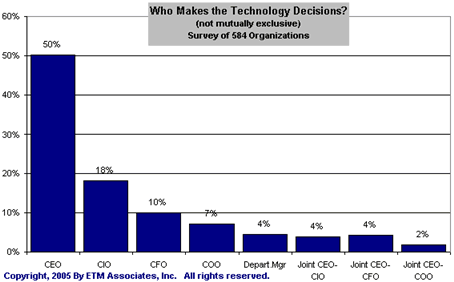|
|
| Home - Industry Article - Jun 06 Issue |
Why CIOs Should Not Make Technology Decisions |
By CJ Rhoads, President and CEO, Enterprise Technology Management Associates, Inc.
Is your CIO making technology decisions all alone? If yes, the recent findings would make you sit up. When CIOs are included on the decision-making team, they improve the overall use of Internet technology. However, when CIOs make the decision alone, they don't do any better than other decision-making groups. The decision-making record of CIOs on web development and e-commerce is simply not good. So, how does a CEO make sure the best technology decisions are made, and when does the CFO get involved?
My whole body deflated as the sinking feeling set in. The tender hope I harbored, that the CIO was sensitive enough to "read between the slides", was being dashed against the rocks of my boss's enthusiasm for what I knew to be a failed project in the making.
I'd been very frank with my boss the previous day about the project "we" were pitching to the CIO, as we were putting together the presentation. I'd come to the conclusion that it was a bad idea - with a capital B. He didn't agree, and I was expressly forbidden from sharing my misgivings with the CIO, the final decision maker.
I tried mental telepathy during the presentation with the CIO. "Please", I silently directed towards him, "ask these questions: How many other companies had implemented this system? What did the potential business users think of the software? How would this system help the business meet the needs of the customer?" The result? My ability to predict a poor decision obviously outstripped my ability at telepathy. Without all the facts, the CIO predictably made the wrong decision. He very much regretted his decision almost two years and many hundreds of thousands of dollars later.
This was almost ten years ago, a time of tremendous change for Information Technology. "EDP" was just giving way to "IS". Directors of "MIS" were being promoted to a relatively new title "CIO". In many companies technology departments were still reporting to the CFO, and Information Systems was still a cost center. Decisions about technology were still mostly left up to the "experts" - the CIO or the MIS Director. Businesses didn't really have much of a say, and often didn't seem to care.
Enter the Internet, and everything changed.
Information Technology moved out of the back room and took its rightful place at the strategy table for its "newfound" ability to increase revenues instead of just saving dollars and lowering headcount. I was curious as to whether or not this notoriety gave CIOs a major role in the business strategy decision-making. I was also interested in whether or not the CEO was involved in making the technology decisions. Finally, I wondered if it turned out better for the company if the CEO or the CIO made the technology decisions.
Last year I finally got a chance to investigate these questions. I lead a team that completed a two-year study for the Berks County Chamber of Commerce in Pennsylvania. Out of the 584 organizations of all sizes, who participated in the survey, we were surprised to find only 91 companies (16%) had the CIO being the sole technology decision maker. Furthermore, only 18% (122 of the companies) included "CIO/IT Director/IT Manager" as one of the people who made the technology decisions for the company when the senior team made the decision. About half of the companies declared that technology decisions were made by the CEO/President/Owner (50%), and in 48% of the cases, 278 companies, the CEO was the sole technology decision-maker. In only 26 companies, less than 4%, both the CEO and the CIO had been chosen as technology decision makers. The number of companies, where just the CEO and CIO (and not the COO, CFO, or other managers) were the decision makers, was less than 1% (Figure 1).
The sample had companies of all sizes, but I believe the results are slightly biased due to the reflection of the "small town" community where the study took place. Further investigation into the data was warranted.
Figure 1

|
|


|

